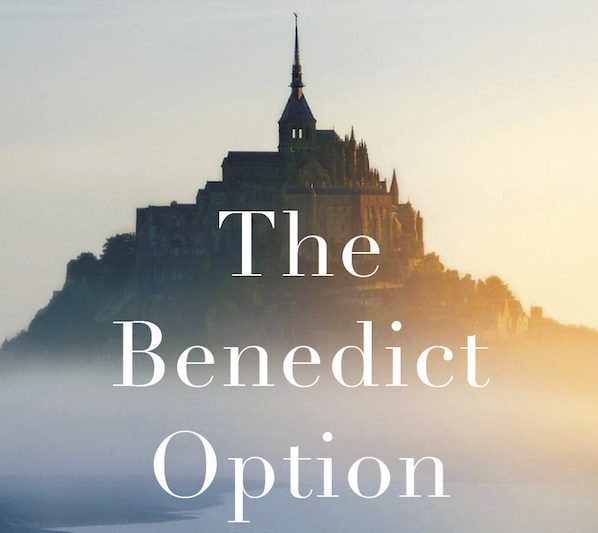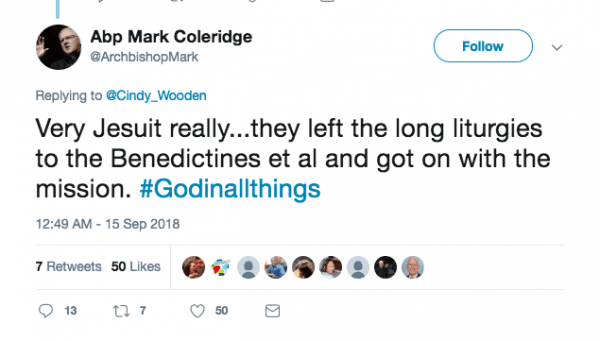Benedict Option & The Church Of The Future

Nice words from the Vatican journalist Sandro Magister this morning. I have admired him for years, and regret that I didn’t have the chance to meet him in Rome. He writes:
That “The Benedict Option” is truly “the most important religious book of the decade” — as David Brooks predicted in the “New York Times” — is now beyond a doubt, seeing how the discussion it has generated has come to involve even the highest levels of the Catholic Church.
In presenting this book last week in the chamber of deputies of the Italian republic, Archbishop Georg Gänswein, Joseph Ratzinger’s secretary before and after his resignation from the papacy, in fact did not hesitate to bring to the field the two most recent popes, because – he said – “even Benedict XVI from the moment of his resignation conceived of himself as an elderly monk who feels it his duty to dedicate himself above all to prayer for Mother Church, for his successor Francis and for the Petrine ministry instituted by Christ himself.”
Of course, the Benedict of the “option” – in the book by the American former Catholic and now Orthodox Rod Dreher – is not pope Ratzinger, but Saint Benedict of Norcia, the great monk of the fifth and sixth centuries who gave rise to a formidable rebirth of Christian faith and culture in the chaos that followed the collapse of the Roman empire. But the other Benedict, the pope, evoked precisely that rebirth in his memorable address – absolutely worth rereading – of September 12, 2008 in Paris, at the Collège des Bernardins, essentially proposing that the Catholics of today take up and bring to life again the lesson of that great Benedictine monasticism, at the present juncture of civilization:
“Quaerere Deum” [“Seek God”]
Magister goes on to contrast the way BXVI treasured monasticism with the hostility Pope Francis shows to it. I forget who it was the other day — an Australian bishop, I seem to recall — but someone on Twitter praised Pope Francis’s comment in Palermo that mass should never last longer than 40 minutes. The tweeter said that this is a welcome Jesuit observation; Benedictines are welcome to their longer liturgies, but Jesuits know that there is work to do in the world.
What a shame. The Benedictine charism knows that there must be balance between ora (prayer) and labora (work). Our work in the world as Christians will lose its meaning and focus.
Unfortunately, Magister repeats the canard that The Benedict Option calls for Christians to head for the hills and withdraw from any engagement with the world. A priest at the oratory in Genoa said to me that he has no idea why people keep saying that. “It’s obvious that they haven’t read the book,” he observed. Well, I’m pretty sure Magister read the book. He may not remember it well, and was misled by the remarks others made recently in Rome.
On the flight back from Italy yesterday, I read the 1996 book-length interview with Cardinal Ratzinger, titled Salt Of The Earth. It’s incredible, and confirmed to me that Benedict XVI really was (and is) a prophetic figure. It’s probably better for me that I had not read this interview before writing my own book, else it would have been an even more Ratzingerian project. I’m going to do a separate post on Salt later today, but for now, I want to quote this passage, with reference to the question of withdrawal:
No one can be a Christian alone; being a Christian means a communion of wayfarers. Even a hermit belongs to a wayfaring community and is sustained by it. For this reason it must be the Church’s concern to create pilgrim communities. The social culture of Europe and America no longer offers these wayfaring communities. This brings us back to the previous question about how the Church will live i this increasingly dechristianized society. It will have to form new ways of pilgrim fellowship; communities will have to shape each other more intensely by supporting each other and living in the faith.
The mere social environment is no longer sufficient today; we can no longer take for granted a universal Christian atmosphere. Christians must therefore really support one another. And here there are, in fact, already other forms, “movements” of various kinds, which help to form pilgrim communities. A renewal of the catechumenate is indispensable. This makes it possible to receive training in and knowledge of Christianity Close association with monastic communities will certainly be one way t have an experience of the Christian reality. In other words, if society in its totality is no longer a Christian environment, just as it was not in the first four or five centuries, the Church herself must form cells in which mutual support and a common journey, and thus the great vital milieu of the Church in miniature, can be experienced and put into practice.
[Seewald:] … How are these active communities going to be shaped? Can we also imagine Christian kibbutzim in Germany?
Why not? We will have to see how things turn out. I think it would be misguided, indeed, presumptuous, to design now a more or less finished model of the Church of tomorrow, which more clearly than today, will be a Church of a minority. But I think that many people will more or less rely on her, who will somehow, and from the outside, as it were, share her inner life. Despite all the changes that we can expect, I am convinced that the parish will remain the essential cell of community life. But it will be scarcely possible to keep up the entire parish system as it now exists a system that by the way, is of rather recent date. We will have to learn how to come together, and that will be an enrichment. Just as almost always in history there are also groups that are held together through a specific charism, through the personality of a founder, through a specific spiritual way. Fruitful exchange between parishes and “movements” is necessary: the movement needs the connection with the parish so as not to become sectarian; the parish needs “movements” in order not to ossify. [Emphasis mine — RD] Even now new forms of consecrated life are forming in the midst of the world. Anyone who looks at what is happening can find an astonishing diversity of Christian forms of life today, in which the Church of tomorrow is already very clearly among us.
There are a number of passages like that. In it, the future Benedict XVI very clearly says that we must create smaller communities for the sake of preserving and passing on a living faith in a post-Christian age, but also insists that these communities must not be cut off from the mainstream, for to do so risks falling into extremism and error. This is exactly what I believe and write about in The Benedict Option!
I keep talking about the Tipi Loschi community as an ideal example because they really are “in the world, but not of the world,” and in a really fruitful, joy-filled way. I spent my last couple of days in Italy with three young Italian couples who are trying to find their way toward building a Benedict Option fellowship together. They all attend their ordinary parish, but find that they want and need more in their Christian journey, and are attempting to do what Cardinal Ratzinger suggested — this, not INSTEAD OF life in their parish, but IN ADDITION TO that life.
I’ll write more on this later today. Salt Of The Earth truly is an extraordinary book. Much of its content is specifically Catholic, but Cardinal Ratzinger’s assessment of what it means to be a Christian in a post-Christian world is highly relevant to all of us. He is a man of such great hope and faith. I cannot think of a single churchman whom I admire and cherish more.
Finally on this point, an Italian friend sent me this excerpt from a recent interview with Cardinal Angelo Scola, the former Archbishop of Milan. Here is the Google Translate version:
There are those who, to safeguard what you call” conscience supported by faith “, has launched the so-called” Benedict option “. It is the idea theorized by the Scottish philosopher Alasdair MacIntyre and more recently by the American journalist Rod Dreher, that is to say small communities inside which faith is preserved as the only form of resistance to general drift. What do you think?
I think that these communities are providential if they remain connected to the existing realities of the Church, especially where they still have popular and vital roots. In fact today, in many parts of the world, there are already small groups, but also large movements with hundreds of thousands of adherents, who witness the beauty of the Christian faith and develop a personal and family lifestyle that goes against the current. It is necessary to encourage the grafting of these new shoots in the old trunk of the Church for a rebirth of Christianity.
If instead the “Benedict Option” is thought of as a new model that must replace the current one, considered outdated and inadequate, then we are facing a serious mistake. If this were the vision of the authors, we should no longer worry about the great organization of the Church in general but build small communities that resist the barbarism of our time. If this were indeed so, we would be faced with a project of self-isolation which is the negation of the essence of Christianity.
I hope Cardinal Scola will read my book — the Italian version is the No. 1 bestseller in the Roman Catholicism category on Amazon Italy — so he will see that I am not talking about the Ben Op as a replacement for anything, but rather a strategy for living out the truth of Christianity more effectively in a dechristianized civilization. The Ben Op will look different for Catholics than for Protestants and Orthodox, and it will even look different depending on the local needs of various Catholic communities. What works for the people of San Benedetto del Tronto will not necessarily work for, say, the small group of families in Brianza. That’s okay, that’s normal! The point is to face the Rule of St. Benedict, and the example of monks, and to think creatively about how to incorporate their spirituality, and their spiritual discipline, into our lives, so as to deepen the interior experience of Jesus Christ, and to build out from our renewed hearts and minds the kinds of structures that serve as an “ark” within which the faithful can ride out this great flood, and take on more refugees caught in the storm.
UPDATE: James C. found the tweet:

Subscribe for as little as $5/mo to start commenting on Rod’s blog.